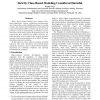Free Online Productivity Tools
i2Speak
i2Symbol
i2OCR
iTex2Img
iWeb2Print
iWeb2Shot
i2Type
iPdf2Split
iPdf2Merge
i2Bopomofo
i2Arabic
i2Style
i2Image
i2PDF
iLatex2Rtf
Sci2ools
106
click to vote
HICSS
1996
IEEE
1996
IEEE
Strictly Class-Based Modeling Considered Harmful
Many object-oriented methods have assumed classbased approaches, without considering prototype-based ones. Some authors, while admitting prototypes as a useful concept, only envision their application in early phases of systems development. Others consider only the use of the prototype concept in programming environments and not with respect to the whole systems development process. We propose that these omissions are neither necessary nor useful and often can be harmful, in that methods grounded in purely class-based assumptions do not reflect the nature of problems inherent in modeling. In this paper, we argue, using the principle of limited reduction, that both class-based and prototype-based approaches should be used in object-oriented methods, respectively for controlling complexity, and capturing enough detail for evolution.
Biometrics | HICSS 1996 | Many Object-oriented Methods | Object-oriented Methods | Systems Development |
| Added | 07 Aug 2010 |
| Updated | 07 Aug 2010 |
| Type | Conference |
| Year | 1996 |
| Where | HICSS |
| Authors | Birgitte Krogh, Sean Levy, Allen H. Dutoit, Eswaran Subrahmanian |
Comments (0)

